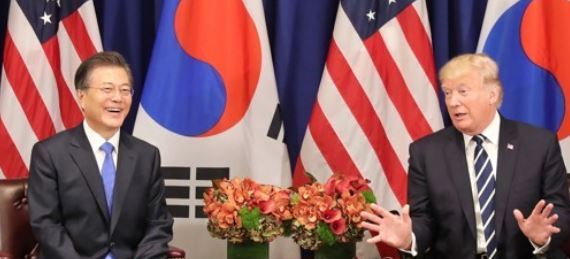Thorny issues to put alliance to test at Moon-Trump summit
By YonhapPublished : Nov. 2, 2017 - 13:58
The presidents of South Korea and the United States are set to hold a summit next Tuesday on a wide range of bilateral and regional issues, including what many believe to be potential deal breakers.
The summit in Seoul will be the sixth meeting between Moon Jae-in and Donald Trump since taking office earlier this year, including two three-way talks involving Japanese Prime Minister Shinzo Abe.
The two leaders are expected to focus on North Korea's growing nuclear and missile threats, and the allies' joint defense capabilities to counter its provocations, according to Seoul presidential officials.
Trade will also be high on their agenda as the countries recently launched a formal discussion on modifying their bilateral free trade agreement.
In addition, pending issues of their defense alliance may be discussed, such as the two countries' sharing of costs for US Forces Korea and Seoul's move to retake the wartime operational control of its forces from Washington.

Concerns are growing here that the tricky issues of the trade pact and military costs have the potential to rattle bilateral ties down the road should they fail to meet in the middle.
The renegotiation of the Korea-US FTA has fueled fears over the possible termination of the pact, which surely would cause serious damage to their alliance.
The Trump administration demanded negotiations to address its growing trade deficit with South Korea in products.
Seoul agreed to start the process last month, shortly after the US president was said to have instructed his officials to prepare for a withdrawal from the Korea-US FTA.
Later, South Korean Trade Minister Kim Hyun-chong noted his country may be forced to give up the FTA altogether should the US continue to make unfair and unreasonable demands.
"We entered into negotiations... taking all possibilities into consideration, including the case of the negotiations falling apart," he told a parliamentary audit.
South Korea earlier cited its own growing trade deficit with the US in the service sector, along with various reports, including those from US think tanks, that the US' increased trade deficit with South Korea may have been caused by its own problems, rather than the Korea-US FTA.
The upcoming defense talks on how to share the burden of maintaining US troops in South Korea is another issue that could cause the alliance to quickly turn sour, according to officials here.
Washington has long demanded Seoul shoulder a greater portion of the cost, including cash payments, and the demand is expected to get only stronger under the new US president's America First policy.
Seoul, on the other hand, insists it is already paying more than enough, also citing the fact that it continues to provide vast amounts of land for US military bases here free of charge.
President Moon has also personally noted his country just spent $11 billion to expand and renovate the US military base in Pyeongtaek, 40 kilometers south of Seoul.
The US president is set to visit the Pyeongtaek base when he arrives here on a state visit next week.
Cheong Wa Dae officials expressed hope Trump's trip to the US military base will make him realize how much South Korea was doing for its ally.
Despite many such pending issues, North Korea and its evolving nuclear and missile threats will likely continue to sit high on the agenda of the upcoming summit.
In their previous meetings, the two leaders stressed the need to put more and more pressure on Pyongyang, so the reclusive regime would stop its provocations and start discussing peace.
In their last summit, held on the sidelines of the UN General Assembly in New York, they agreed to build their joint deterrence against North Korean threats to an "overwhelming" level that they said would put the "strongest pressure and sanctions" on North Korea.
The agreement followed North Korea's latest and most powerful nuclear test so far, staged Sept. 3.
"The two leaders shared a view on the need for the strongest pressure and sanctions against North Korea to deter North Korea's provocative activities and make it start taking steps toward denuclearization," Cheong Wa Dae spokesman Park Soo-hyun said earlier of the outcome of the latest South Korea-US summit, held Sept. 22.
Moon and his US counterpart are widely expected to again stress the need for the North to refrain from any provocations when they meet here next week. (Yonhap)












![[Today’s K-pop] BTS pop-up event to come to Seoul](http://res.heraldm.com/phpwas/restmb_idxmake.php?idx=644&simg=/content/image/2024/04/17/20240417050734_0.jpg&u=)





![[KH Explains] Hyundai's full hybrid edge to pay off amid slow transition to pure EVs](http://res.heraldm.com/phpwas/restmb_idxmake.php?idx=652&simg=/content/image/2024/04/18/20240418050645_0.jpg&u=20240419100350)

